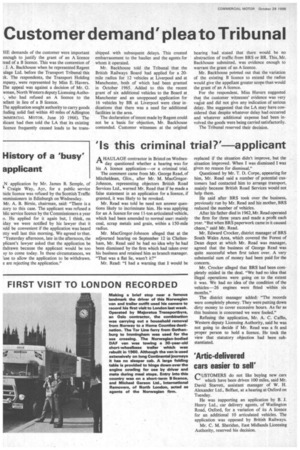Customer demand' plea to Tribunal
Page 34

If you've noticed an error in this article please click here to report it so we can fix it.
HE demands of the customer were important enough to justify the grant of an A licence read of a B licence. This was the contention of . J. A. Backhouse when he represented Regent ulage Ltd. before the Transport Tribunal this The respondents, the Transport Holding mpany, were represented by Miss E. Havers. The appeal was against a decision of Mr. G. vrman, North Western deputy Licensing Authof, who had refused an A licence to the )ellant in lieu of a B licence.
The application sought authority to carry goods :luding solid fuel within 40 miles of Adlington )MMERCIAL MOTOR, June 10 1966). The )licant had then told the LA that its existing licence frequently caused loads to be trans
shipped with subsequent delays. This created embarrassment to the haulier. and the agents for whom it operated.
Mr. Backhouse told the Tribunal that the British Railways Board had applied for a 20mile radius for 12 vehicles at Liverpool and at Manchester, both of which had been granted in October 1965. Added to this the recent grant of six additional vehicles to the Board at Manchester and an unopposed application for 16 vehicles by BR at Liverpool were clear indications that there was a need for additional facilities in the area.
The declaration of intent made by Regent could• not be a basis for objection, Mr. Backhouse contended. Customer witnesses at the original hearing had stated that there would be no abstraction of traffic from BRS or BR. This, Mr. Backhouse submitted, was evidence enough to warrant the grant of an A licence.
Mr. Backhouse pointed out that the variation of the existing B licence to extend the radius would give the appellant greater scope than would the grant of an A licence.
For the respondent, Miss Havers suggested that the customer witnesses' evidence was very vague and did not give any indication of serious delay. She suggested that the LA may have considered that despite whatever delay had occurred and whatever additional expense had been involved the goods were being carried satisfactorily.
The Tribunal reserved their decision.
























































































































